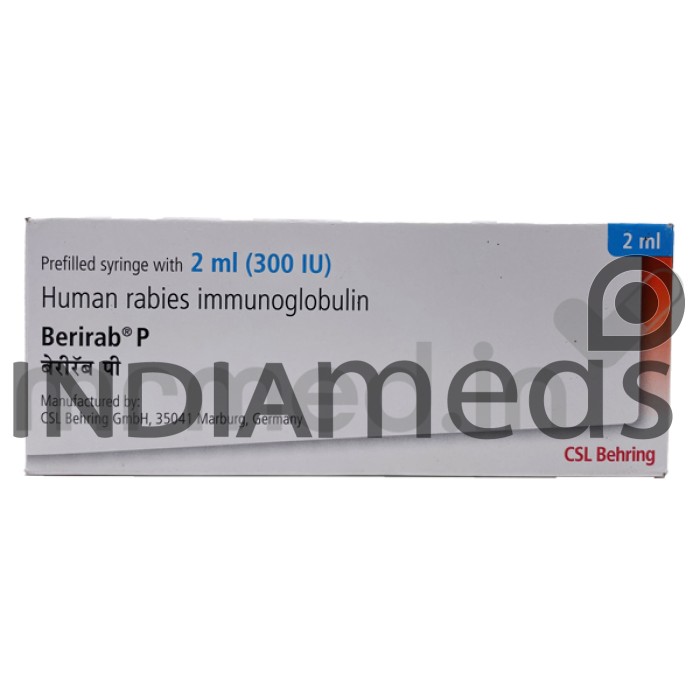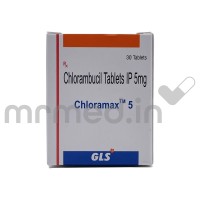Berirab P 300 IU Injection contains the active agent Human Rabies Immunoglobulin (HRIG). It is indicated to prevent passive, transient rabies infection after exposure to a rabid animal (dogs, mongoose, jackals, foxes). This injection is formulated from blood plasma from screened donors. Rabies infection spreads when a person is bitten, scratched, or licked by an infected animal, especially when the skin is already injured. Rabies is a serious and often fatal viral disease that can cause severe neurological symptoms, including fever, headache, muscle weakness, and paralysis. Once symptoms develop, the disease is almost always fatal. Though this infection is 100% fatal, it is 100% preventable with timely measures and the correct use of available vaccines, immunoglobulins, or monoclonal antibodies.
People with a history of severe allergic reactions to Berirab P 300IU Injection or any of its components should not receive this medication. This injection is prepared from human plasma and may contain infectious agents that can cause disease. Report to your physician immediately if you experience symptoms like headache, nausea, fever, vomiting, weakness, muscle pain, or diarrhea, as these symptoms indicate a possible viral infection. Pediatric patients require special considerations regarding the use of Berirab P 300IU Injection. It can be used in elderly individuals, but the dose and administration may need to be adjusted based on age, weight, and health status.
Therapeutic Effects of Berirab P 300iu Injection
Pregnancy
Pregnant women should consult their healthcare provider about their pregnancy status before receiving Berirab P 300IU Injection.
Breast Feeding
It is unknown if Berirab P 300IU Injection is excreted in human breast milk, so breastfeeding women should consult a healthcare provider before taking the injection.
Lungs
In individuals with lung conditions such as asthma or chronic obstructive pulmonary disease (COPD), Berirab P 300IU Injection can cause shortness of breath or worsen respiratory symptoms.
Liver
Patients with preexisting liver disease should talk to their healthcare provider before taking it.
Alcohol
individuals should avoid consuming alcohol before or immediately after receiving Berirab P 300IU Injection, as alcohol can impair the immune system and potentially reduce the effectiveness of the treatment.
Driving
Patients should always monitor their response to the Berirab P 300IU Injection medication and be cautious when driving or operating machinery if they experience any side effects that may impair their ability to do so safely.
Serious:
- Severe allergic reactions
- Respiratory distress
- Blood pressure changes
- Seizures or convulsions
- Chest pain
- Unusual warmth of limb
Common:
- Pain, swelling, or redness at the injection site
- Fever
- Headache
- Nausea
- Dizziness
Berirab P 300IU Injection is not a vaccine and cannot prevent rabies infection. It is used to provide immediate passive immunity to individuals exposed to rabies who may not yet have developed their immune response. A rabies vaccine is typically given with Berirab P 300IU Injection to provide long-term protection against rabies.
Berirab P 300IU Injection can be given to individuals with compromised immune systems who have been exposed to rabies. However, it is important to consult with a healthcare provider before receiving this medicine, as these individuals may be at a higher risk of developing adverse reactions.
Berirab P 300IU Injection may be given to individuals who have already received a rabies vaccine as a part of post-exposure prophylaxis. However, the timing of the vaccine and Berirab P 300IU Injection administration may differ depending on the individual's vaccination history and the severity of the exposure.
Berirab P 300IU Injection may interfere with the immune response to live virus vaccines, including measles, mumps, rubella, and varicella. Therefore, individuals who have received blood transfusions or products should consult with a healthcare provider before receiving this injection to determine the appropriate timing of any live virus vaccines.
Berirab P 300IU Injection may be associated with some individuals' increased risk of Guillain-Barré syndrome. Therefore, individuals with a history of Guillain-Barré syndrome should consult a healthcare provider before receiving this injection.
The protective effect of Berirab P 300IU Injection varies depending on the individual's immune response and the severity of the rabies exposure. It provides immediate passive immunity, but the duration of protection is limited. A rabies vaccine is typically given with this injection to provide long-term protection against rabies.
Molecule name: Human Rabies Immunoglobulin | Therapeutic class: Immunizing agent |
Pharmacological class: Immunoglobulins | Indications: Treatment of COVID-19 |












-200x200.jpg)


